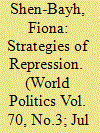| Srl | Item |
| 1 |
ID:
186700


|
|
|
|
|
| Summary/Abstract |
Understanding sources of judicial bias is essential for establishing due process. To date, theories of judicial decision making are rooted in ranked societies with majority–minority group cleavages, leaving unanswered which groups are more prone to express bias and whether it is motivated by in-group favoritism or out-group hostility. We examine judicial bias in Kenya, a diverse society that features a more complex ethnic landscape. While research in comparative and African politics emphasizes instrumental motivations underpinning ethnic identity, we examine the psychological, implicit biases driving judicial outcomes. Using data from Kenyan criminal appeals and the conditional random assignment of judges to cases, we show that judges are 3 to 5 percentage points more likely to grant coethnic appeals than non-coethnic appeals. To understand mechanisms, we use word embeddings to analyze the sentiment of written judgments. Judges use more trust-related terms writing for coethnics, suggesting that in-group favoritism motivates coethnic bias in this context.
|
|
|
|
|
|
|
|
|
|
|
|
|
|
|
|
| 2 |
ID:
161961


|
|
|
|
|
| Summary/Abstract |
Strategies of repression vary widely between extrajudicial and judicial extremes, from unrestrained acts of violence to highly routinized legal procedures. While the former have received a great deal of scholarly attention, judicial methods remain relatively understudied. When and why do rulers repress their rivals in court? The author argues that autocrats use a judicial strategy of repression when confronting challengers from within the ruling elite. Unlike regime outsiders, who pose a common, external threat to mobilize against, insiders present a more divisive target. When autocrats confront the latter, a judicial strategy legitimizes punishment, deters future rivals, and generates shared beliefs regarding incumbent strength and challenger weakness. Using original data on political prisoners in postcolonial sub-Saharan Africa, the author finds that autocrats were significantly more likely to use a judicial strategy against insiders and an extrajudicial strategy against outsiders. A case study of Kenya traces the logic of the theory, showing how intraregime conflict made courts a valuable instrument of state repression. The findings demonstrate how courts can play a central role in autocratic survival.
|
|
|
|
|
|
|
|
|
|
|
|
|
|
|
|